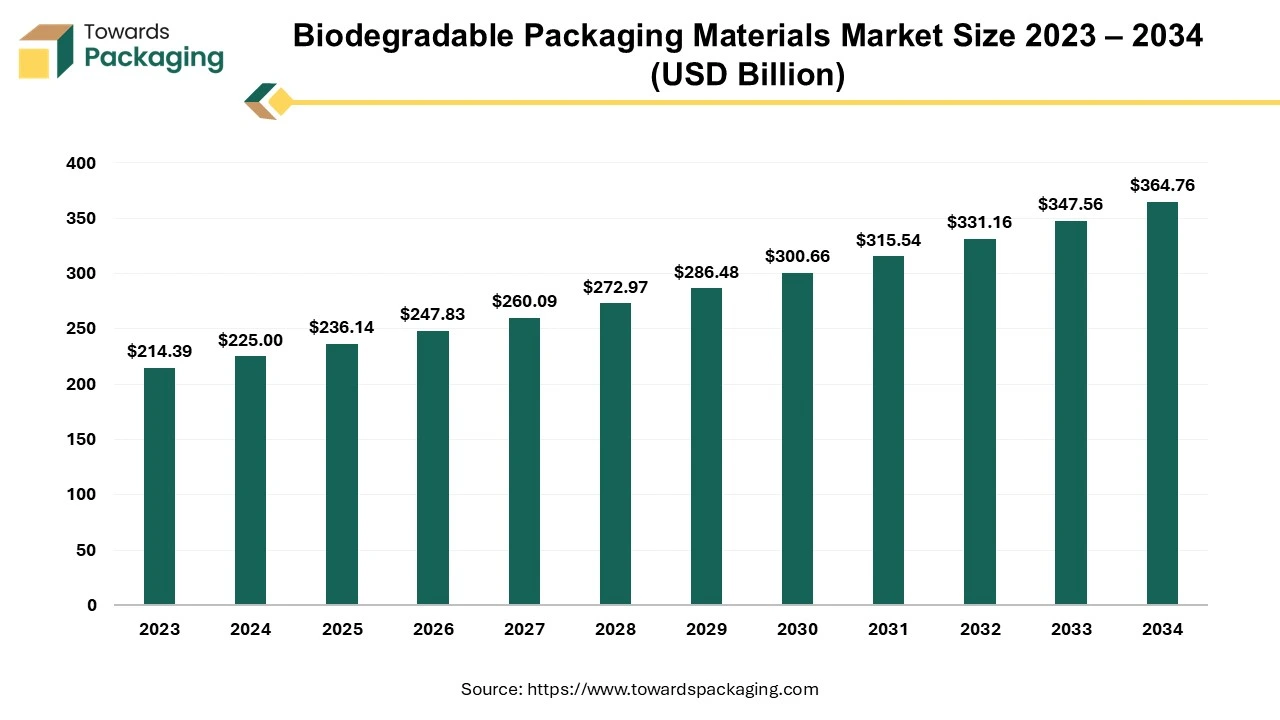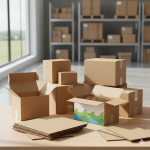The global biodegradable packaging materials market reached US$ 225 billion in 2024 and is projected to hit around US$ 364.76 billion by 2034, expanding at a CAGR of 4.95% during the forecast period from 2024 to 2034. Integration of AI and technology will contribute to market growth.

Get All the Details in Our Solution – Download Brochure: https://www.towardspackaging.com/download-brochure/5392
The packaging material made from natural resources benefits the environment. The market for biodegradable packaging materials centers around producing and distributing packaging materials made from renewable sources such as plants and microorganisms. Utilization of these materials reduces plastic waste, polluting the ocean and landfills since it decomposes naturally. Along with this, reducing carbon emissions and recycling and repurposing features of sustainable packaging are the leading objectives of the market.
The decomposition of biodegradable materials occurs through microorganisms such as bacteria, fungi, and algae, breaking the materials down into different substances like water, carbon dioxide, and biomass. Conserving resources and maintaining a circular economy contribute to market growth. Apart from this, the demand for biodegradable packaging spans various sectors, such as food and beverages, pharmaceuticals, and consumer goods.
Major Applications of Biodegradable Packaging Materials
The primary function of biodegradable packaging materials is to reduce waste by using packaging materials such as paper and cardboard due to their recycling properties and edible films made from plant-based materials. The mushroom packaging is made from powdered agricultural waste and tied together by a matrix of mushroom roots; mycelium is used for packaging food items due to its easy-opening container. The implementation of sustainable packaging plays a crucial role in enhancing the use of recycled production by significantly reducing the waste of PET material and minimizing the use of traditional plastic products.
In contrast, packaging products made from a 100% blend of co-polyester and PLA (sugar cane) will fuel the market growth. Utilizing compostable bags that are leakproof and fully recyclable will, in turn, lead to less use of petroleum supplies and optimized shipping costs. The biodegradable packaging materials market comes in various sizes and shapes since the customization option provides consumer-preferred packaging that comes in trays, rigid boxes, unique product configurations like upright, flat, or angled, and heavy objects showcasing the versatile use of the bio-based packaging and ensuring the transportation and protected packaging of products. It also ensures cost-effectiveness and less carbon reduction, given that biodegradable plastics emit only 0.8 tons of carbon – a 500% reduction.
Market Trends
- The inculcation of innovative packaging materials like hemp pulp, made from hemp strains, offers a higher cellulose concentration and has a faster growth cycle than trees. Its utilization of a sulfur-free process provides a sustainable solution to market growth.
- Utilization of mushroom packaging, made from mycelium, the root structure of mushrooms provides protective packaging and is customizable according to customer preferences. The packaging solution offers water resistance, biodegradability, and thermal insulation. The unique feature of the rapid prototyping process that provides a perfect fit for specific products makes it a popular choice among consumers.
- Adopting packaging made from fast-growing seaweed, kelp, and biopolymer plays a crucial role by providing customizable thickness, transparency, and texture. The seaweed packaging solution will promote an eco-friendly packaging initiative as its base material, kelp, purifies water and removes CO2.
- Implementation of high-barrier packaging will contribute to market growth as the ultra-thin alumina (aluminum oxide) layer is released onto cellulose materials like paper and cardboard, creating double-barrier packaging. The coating also offers water resistance, oxygen, and moisture barriers without obstructing the recyclability or biodegradability of the paper.
- Alterpacks, a leading sustainable company, offers home-compostable food containers made from upcycled food waste and spent grains. The containers are FDA and SFA-certified for safe food contact, providing leak resistance and microwave compatibility features. The company provides containers in various shapes and sizes and reduces waste landfills using recycled waste.
Invest in Our Premium Strategic Solution: https://www.towardspackaging.com/price/5392
Get the latest insights on packaging industry segmentation with our Annual Membership – https://www.towardspackaging.com/get-an-annual-membership
If you have any questions, please feel free to contact us at sales@towardspackaging.com
Browse our Brand-New Journal:
https://www.towardshealthcare.com
https://www.towardsautomotive.com
For Latest Update Follow Us: https://www.linkedin.com/company/towards-packaging/
Get Our Freshly Printed Chronicle: https://www.packagingwebwire.com/


